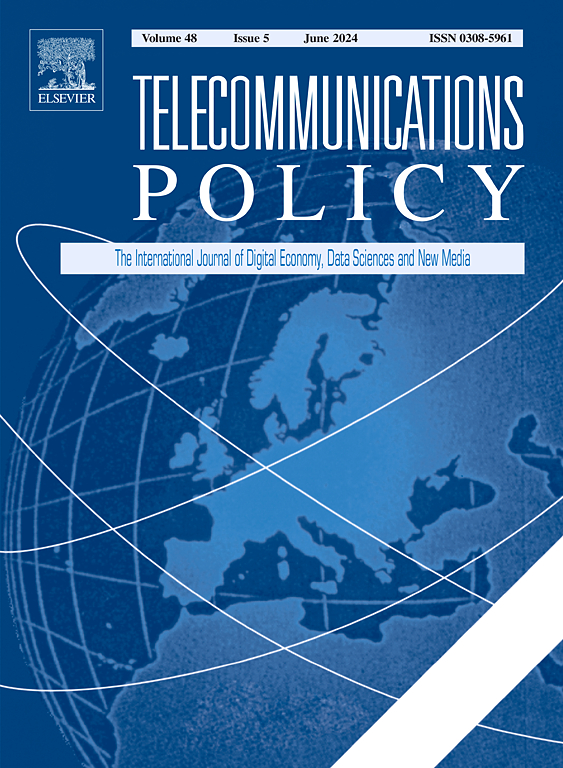A new digital era: Challenges and opportunities for Thai women in online marketplace
IF 6.4
2区 管理学
Q1 COMMUNICATION
引用次数: 0
Abstract
This study investigated gender differences in Information and Communications Technology (ICT) and the determinants of women's participation in the online marketplace. We conducted descriptive and empirical analyses using data from the 2010 to 2023 Household Survey on the Use of ICT, which provides comprehensive data on ICT access and usage at both the household and individual levels. Moreover, to capture firm's characteristics involving in online market after the COVID-19 pandemic, we utilize the ICT establishment survey (ICTE) from 2020 to 2022. Both ICT and ICTE cover all country regions and are nationally representative, with an individual sample of around 30,000 and firm sample around 145,000. We found that gender, education, and digital access significantly influence participation in online shopping and online business in Thailand. Women are 10 percentage points more likely to shop online than men. Compared to primary education, university and secondary education increase the probability by 20 and 13 percentage points, respectively. Owning a device and using a computer increases the likelihood of online shopping by 11 and 17 percentage points, respectively. For online businesses, gender and marital status are not significant factors, but education remains important. While being unemployed reduces the probability of engaging in online business by 1.3 percentage points, access to digital devices and computer usage increases the probability by around three percentage points. For the firms, the use of computers increases the probability of participating in online shopping by 27.2 percentage points and doing online business by 23.3 percentage points. Disaggregated results highlight that younger, better-educated, urban women are more active in the online marketplace, supporting theories of digital inequality shaped by personal and structural factors. By applying the RA theory to digital inclusion, we highlight how unequal access to technology and education amplifies existing market inequalities. Our policy recommendations are designed to close these gaps, promoting a more inclusive and competitive digital economy in Thailand.
新数位时代:泰国女性在网路市场的挑战与机遇
本研究调查了信息和通信技术(ICT)领域的性别差异以及女性参与在线市场的决定因素。我们利用2010年至2023年信息通信技术使用家庭调查的数据进行了描述性和实证分析,该调查提供了家庭和个人层面信息通信技术获取和使用的全面数据。此外,为了捕捉2019冠状病毒病大流行后参与在线市场的企业特征,我们利用2020年至2022年的ICT企业调查(ICTE)。ICT和ICTE覆盖所有国家区域,具有全国代表性,个人样本约为30,000,公司样本约为145,000。我们发现,性别、教育和数字访问对泰国在线购物和在线业务的参与有显著影响。女性网购的可能性比男性高10个百分点。与初等教育相比,大学和中等教育的可能性分别提高了20和13个百分点。拥有电子设备和使用电脑分别使网上购物的可能性增加11%和17%。对于在线业务来说,性别和婚姻状况不是重要因素,但教育程度仍然很重要。失业使从事在线业务的可能性降低了1.3个百分点,而使用数字设备和电脑则使这一可能性提高了约3个百分点。对于这些公司来说,使用电脑使他们参与网上购物的可能性增加了27.2个百分点,从事网上业务的可能性增加了23.3个百分点。分类结果显示,年轻、受过良好教育的城市女性在网络市场上更为活跃,这支持了个人和结构性因素影响的数字不平等理论。通过将RA理论应用于数字包容,我们强调了获取技术和教育的不平等如何放大了现有的市场不平等。我们的政策建议旨在缩小这些差距,促进泰国更具包容性和竞争力的数字经济。
本文章由计算机程序翻译,如有差异,请以英文原文为准。
求助全文
约1分钟内获得全文
求助全文
来源期刊

Telecommunications Policy
工程技术-电信学
CiteScore
10.80
自引率
12.50%
发文量
122
审稿时长
38 days
期刊介绍:
Telecommunications Policy is concerned with the impact of digitalization in the economy and society. The journal is multidisciplinary, encompassing conceptual, theoretical and empirical studies, quantitative as well as qualitative. The scope includes policy, regulation, and governance; big data, artificial intelligence and data science; new and traditional sectors encompassing new media and the platform economy; management, entrepreneurship, innovation and use. Contributions may explore these topics at national, regional and international levels, including issues confronting both developed and developing countries. The papers accepted by the journal meet high standards of analytical rigor and policy relevance.
 求助内容:
求助内容: 应助结果提醒方式:
应助结果提醒方式:


